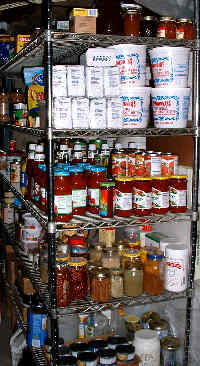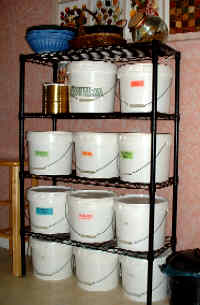
Whether therefore ye eat, or drink, or whatsoever ye do, Wherefore do ye spend money for that which is not bread? and your labour for that which satisfieth not? The PrincipleOut of gratitude to Jehovah Jireh, our “Lord Who Provides,” we, as Christians, should be responsible to take good care of the resources He has provided for our use. This includes our bodies, our finances, our spiritual well being, our homes and material goods, our marriages, our families, our friendships, our education, our jobs and ministries, among other things. We want to glorify God through every aspect of our lives. Waste and neglect, chaos and confusion are not attributes of the Most Holy God (1 Corinthians 14:33). When these things are present, we are not displaying an accurate picture of God in our lives. Is there anything in these distasteful downfalls which would cause an unbeliever to seek that precious difference in our lives, Jesus Christ? Of course not! When you are saddled with confusion and bound to a cruel master, such as debt or chronic health problems, are you experiencing an abundant life? Jesus' burden is easy and His yoke is light. One way to stay out of debt is to reduce your grocery bill. One way to help prevent disease is to eat more nutritiously. Both of these can be accomplished in a variety of ways and we would like to share some of those, particularly the method of purchasing whole foods in bulk. Most people believe that eating healthfully has to be expensive. This is a lie many people have bought into by purchasing whatever new line of beautifully packaged “Healthy Decisions” entrees and snacks are being promoted by your particular grocery or health food store. Prepared and packaged foods are not healthy. They may have less fat, less sugar or some added fiber, and that is great! However, they are full of chemicals, practically void of God-given nutrients and often the serving size has been manipulated to an unrealistically small amount in order to be promoted as fat, cholesterol or sugar free. It is fine to eat these things; God will not love you any less, but don't fool yourself into thinking they are healthy. And you may not want to ask yourself the question, “Am I really getting a good value for my money?” Okay, those of you who purchase whole foods at the little health food shop down the street; it is time to have your toes stepped on, too. By all means, continue to support that little store, especially if it is Christian, but is paying a dollar for one pound of brown rice, really economical when you could be paying under thirty cents a pound? It may not sound like much, just seventy cents. One pound of rice equals approximately 2 ½ cups. For our large family, I use about five cups of rice each time I make it. So I am saving $1.40 on each meal. If I make rice five times a month, I have saved seven dollars this month, and eighty-four dollars a year, on rice alone. You may have a smaller family and only use half as much. You have still saved forty-two dollars and forty-two dollars is forty-two dollars that could be given to support a missionary, used to get out of debt, used on vacation, or spent for homeschool curriculum. That’s just rice! Think how much more you are going to save in other areas of your grocery bill. When we talk of bulk buying, we are referring to three different methods, which can be combined to give you a wide selection of foods for less money and better health.
For example, perhaps you use canned diced tomatoes (or Tuna, jelly, salsa, salad dressing, condiments, pickles, olives, refried beans, etc.). The grocery store has a sale on their brand, 14 oz. cans, three for a dollar. Instead of only buying enough for this week, or even this month, we would purchase enough to get us to the next sale on diced tomatoes. Canned goods have already lost most of their nutritive content through the canning process, which is why they should not make up the bulk of your diet. However, they are sealed and should last on your shelves many months or even years without spoiling or tasting bad and they are handy to have when you get into a pinch. You may be purchasing many things by the case and may want to invest in some good quality shelving to put in the basement or garage. Warehouse clubs often carry industrial strength wire shelving for a reasonable price. Next, we are going to purchase fresh vegetables and fruits in bulk. In this scenario, the way you purchase will be based a bit on the size of your household and can be dependent on a certain degree of the Christian Community Concept. No, you don't have to move in together! We're talking about buying a fifty-pound bag of onions from a warehouse club and splitting it between two medium-sized families and a widow. The third and main method of bulk purchasing is bucket buying. You may be familiar with co-ops, which purchase bulk items and break them down between families. Now, expand your vision from co-op ordering once a month, to only ordering once a year. You can order whole grains, beans and dehydrated vegetables in six gallon buckets. You're going to have on hand enough pinto beans to last for at least a year. That may be one six-gallon bucket. You're going to have enough oats for a year, enough rice and wheat for a year. Using this method, you can store enough food to feed a family of four adults in only about ten square feet. You always have what you need on hand, at a fraction of the cost and you don't have to go to the grocery store as often. When you do, it is just a quick trip for a few items. We also advocate purchasing dried fruit in bulk and storing it in this bucket system as well as nuts, peanut butter, coconut, natural sugar, honey, molasses and other staples. Bulk Buying F.A.Q.There are only two of us... I’m single... My household is too small to make bucket buying practical. What should I do? Whole grains will keep indefinitely if properly stored in airtight buckets. You may not order as many buckets of a particular item as a larger family, but you will eventually eat through your supply, and it is usually sooner than you expect. You are certainly welcome to utilize the Christian Community Concept and arrange for another family to sell you a third of their dried bell peppers, but we encourage people to plan on ordering enough food to last them at least one year. What should I order? Whatever you want??? Why would I want to eat dried food? Dehydration is probably the oldest form of preservation. Dried foods are mentioned throughout the Bible: raisins, figs and beans, to name a few. Americans eat dehydrated vegetables all the time and do not realize it. Many of the packaged mixes and prepared foods purchased at grocery stores contain dried vegetables or previously dried vegetables. Many people have returned to the ancient custom of eating dried fruit and enjoy it immensely, though they don't enjoy to price tag the stores give them. Properly dehydrated food retains about 97% of the nutrients and almost all of the digestive enzymes. Dehydrated food is usually picked at its peak ripeness and, if dried properly, retains vivid color, strong fragrance and delicious flavor. If you own a dehydrator and have a bumper crop out in the garden, you may want to dry some of your own produce, but most of the time it is more cost effective and time efficient to purchase commercially dehydrated produce. How do you use this dried stuff? Dehydrated vegetables are easy to use when making soups, casseroles, sauces and side dishes. They are already washed, chopped and seeded. You are eating everything you paid for! When you make soups and sauces, you can measure the amount and just throw it in with the liquids. Other times you will simply let the dried food sit a few minutes in very hot water. For information on using whole grains and making the healthiest homemade bread see our Amazing Grains page and our Wheat FAQ. For information on using dried beans see our Bountiful Beans page. Please do not hesitate to Contact Us if you have questions on the information presented here. |

 The first and most common concept of bulk buying is used when the grocery store has a great sale on items you would normally purchase. Too often people find themselves at the grocery store picking up whatever sounds good for dinner that night and paying a high price for not watching the ads and thinking ahead. If you have your own supply of extra ingredients on hand, you can make what you want, when you want, for much less money.
The first and most common concept of bulk buying is used when the grocery store has a great sale on items you would normally purchase. Too often people find themselves at the grocery store picking up whatever sounds good for dinner that night and paying a high price for not watching the ads and thinking ahead. If you have your own supply of extra ingredients on hand, you can make what you want, when you want, for much less money. Or maybe a group of three families from the same church contacts a produce supply company and orders a case of lettuce, a couple boxes of fresh tomatoes, a bale of carrots (for the family that juices) and several bunches of green onions. These companies often deliver and also offer slightly lower grades of tomatoes (#2 or canning grade) and other produce for a fraction of the regular store prices. You may have a couple tomatoes that are not usable, but even with a few discards you will still be saving a great deal. Remember, these are professional suppliers who are used to dealing with businesses. Settle the children down before calling and be professional. You may even need to give your group an official name.
Or maybe a group of three families from the same church contacts a produce supply company and orders a case of lettuce, a couple boxes of fresh tomatoes, a bale of carrots (for the family that juices) and several bunches of green onions. These companies often deliver and also offer slightly lower grades of tomatoes (#2 or canning grade) and other produce for a fraction of the regular store prices. You may have a couple tomatoes that are not usable, but even with a few discards you will still be saving a great deal. Remember, these are professional suppliers who are used to dealing with businesses. Settle the children down before calling and be professional. You may even need to give your group an official name. Send page to a friend
Send page to a friend
 Add page to favorites
Add page to favorites Bookmark us
Bookmark us


